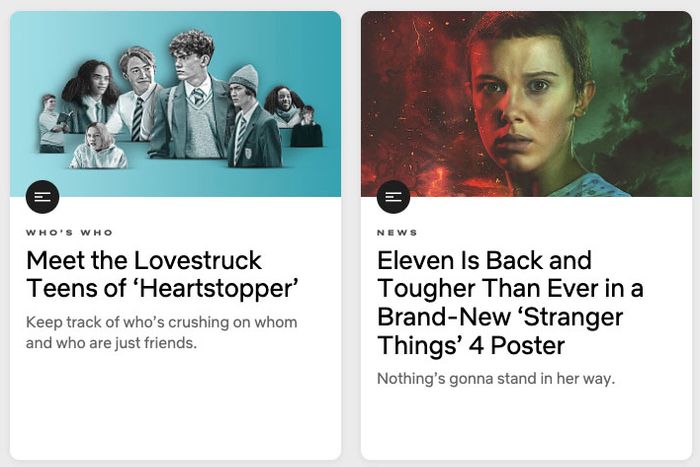
So Netflix abruptly laid off at least ten members of Tudum’s editorial staff and an undisclosed number of folks from its social-media teams. Apparently, the staff was given just two weeks of severance and told to pack up and leave, while Netflix has maintained that it believes Tudum is still kinda sorta important.
If you don’t know what Tudum is, trust, you’re not alone. The company recruited expert journalists — largely women of color — to the branded-content unit just seven short months ago. Tudum didn’t even have a Twitter account. Now the fate of the website is a little up in the air, as it’s not necessarily a “shuttering” but more a restructuring. There are definitely still journalists working there — doing what? It’s not totally clear.
Another round of layoffs in the media game is always terrible news, especially for inexperienced journalists who were just getting a toe in the little crack between the door and the floor. Take it from someone who’s been laid off three times — from MTV News, Mic, and Medium — in a similar fashion and for a similar “restructuring” rationale: The feeling is absolutely trash, and the fear of not being able to sustain yourself is extremely real.
But what it isn’t is special. Netflix treated those beloved journalists in the same way it does its dwindling number of beloved shows (Sense8, The Get Down, Tuca & Bertie, to name a few): a very splashy announcement before an algorithmic burial with no actual marketing support; the inevitable unceremonious cancellation after two seasons, and moving onto another product. It looks like those writers’ two seasons are up.
Journalists facing mass layoffs have a built-in sympathy machine on Twitter, where we have an outsize influence as loudmouths who love being right about every single thing under the sun. And with that influence, the tweets can go from sympathetic to revelatory in the ways that we writers often portray ourselves as some sort of privileged class. Like we’re supposed to be excluded from the machinations of our era’s robber-baron tech giants — as if the entire world (the actual Earth and the people populating it) isn’t feeling its repercussions. Instead of just saying, Hey I lost my job, and this is trash, it becomes, We don’t deserve to be treated like this. And it’s like, yes, obviously, but also get in line, sweet peas, welcome to the Bleak. This is just what it is.
There’s also a kind of disingenuousness with what these writers were actually doing at Netflix. Tudum was a platform to market content that already exists on Netflix. While the Big Red might’ve labeled it a “fan page,” any journalist with experience (and there are many at Tudum) has to know what they’re walking into. Maybe the work was fulfilling. Many of the editorial staff let go yesterday were working on long-term projects that were important to them and would probably end up looking really great on a résumé.
The wave of Tudum’s hirings from the marginalized last year feels more like a PR ploy than anything, especially after the wanton manner of their disposal. That’s the whole “representation-industrial complexing” of it all. Netflix hired journalists from certain communities to show that they were with the diversity shit. But if the anti-trans violence of the Dave Chappelle debacle is any indication, Netflix ain’t really tryna hear any actual concerns from marginalized people.
Besides, Netflix CEO Reed Hastings has always said that the company runs through employees with no problem. In 2020, he told CNBC that he thinks of Netflix as “a professional sports team.” Erin Meyer, co-author of Hastings’s book, No Rules Rules: Netflix and the Culture of Reinvention, said his methodology when it comes to employee relations is something like The Hunger Games. Netflix doesn’t give a damn about anybody, only about the efficacy of its algorithm and, of course, its bottom line.
On that front, Netflix spends tens of billions of dollars on B-rated TV and movies to flood its service while losing valuable IP to rival streamers. When Netflix announced its Q1 decline in subscribers this month, its stock price tanked. What do we know about tech companies? When shit hits the fan, the people who matter the least — writers, social-media managers, and marketers who are usually the most diverse departments — get the ax.
I promise this isn’t so much of an “I told you so” but more of a “Let’s be honest” moment. Being honest, I understand the desire to go work for Netflix in our current moment. Netflix was offering beaucoup cash for the work. It offered stability to writers anxiously clamoring for something that resembled writerly work. Even if it was just marketing, I get the calculus.
Over in journalism media, companies are paying pennies for work that is directly linked to marginalized experiences. It’s not like the publishing world is divorced from these kinds of shady tactics — it’s very much owned by billionaires who at any point could decide that this whole editorial thing isn’t for them. What I imagine will happen at Netflix is something similar to what happened at Medium: A skeleton crew of editors will become more like curators, fielding freelancers for content rather than actual journalism. They might be paid (far less than any salaried worker) to produce a certain amount of content, will receive no benefits, and might not be able to own their work. At the end of the day, journalists have actual concerns about accountability — an actual process and code of ethics that might be too much of an entanglement for executives who feel they don’t have to answer to anyone. Especially not their own employees.
So I get the fear and insecurity. But there’s feigned concern about what actually happened at Tudum. Who among us read a single article on its website? Many of us (myself included) didn’t even know there wasn’t a strategy to distribute the work because we had already pegged exactly what Tudum was: a poorly named strategy for branded content that was doomed from the start.
Tirhakah Love is a senior writer at New York Magazine and the host of the new evening newsletter Dinner Party, a daily email that touches on all things entertainment — that means film, television, music, tech, and gaming — plus politics and corporate clownery. The following essay was originally published in the April 29 edition. Subscribe for more dessert.


